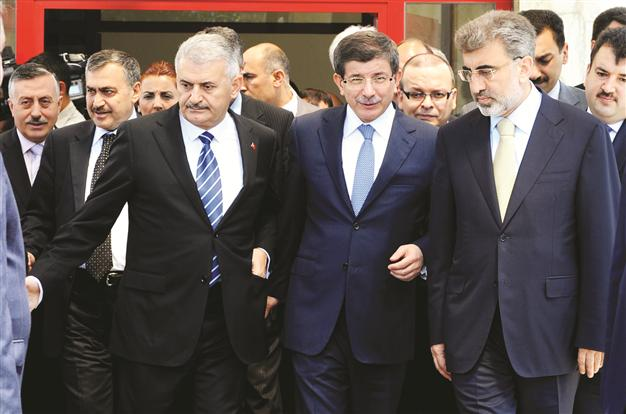Ankara to bolster Iraq routes to bypass Syria
ANKARA – Hürriyet Daily News

Turkish Transport Minister Binali Yıldırım (L), Foreign Minister Ahmet Davutoğlu (C) and Energy Minister Taner Yıldız are seen in this file photo. AA photo
Turkey is planning to open new border crossings with Iraq to provide alternative transit routes for trade with the Middle East that bypass Syria, Transport Minister Binali Yıldırım said yesterday as Ankara prepared to announce sanctions against Damascus.
“If conditions aggravate in Syria, we are planning to shift transport to Iraq by opening new gates,” Yıldırım said. Turkey’s measures would not harm the Syrian people and basic needs such as food and medicines would be supplied regardless of how the situation develops, he said, adding that “tight control” would be ensured to prevent arms and munitions shipments to Syria by land and air.
“Shipping via Iraq to Jordan and from there to Saudi Arabia, Yemen and the Gulf will be supported in particular and the formalities required for those routes will be sped up,” he said, adding that alternative routes would raise transport costs but ensure safety.
Talks continue with Egypt for the inauguration of a ferry line from the southern Turkish port of Mersin to Alexandria, he said, adding that passenger flights between Turkey and Syria continue normally. Energy Minister Taner Yıldız said the suspension of electricity sales to Syria was out of the question because Turkey considered the supply to be “humanitarian assistance” for Syrian people.
Concerns over trade, debt
Business groups involved in trade with Syria voiced concern that exports would nosedive amid tightening international sanctions and a cash-crunch might result in Damascus failing to pay debts owed to Turkish companies.
The bilateral trade volume, which stood at $2.5 billion in 2010, has dropped by 20 percent since July and the downfall may hit 50 percent if Turkey implements sanctions, Doğan Narin, the head of the Turkish-Arab Countries Businessmen Association, said, adding that exporters in the border provinces of Hatay, Gaziantep, Kilis and Şanlıurfa will bear the brunt.
The co-chair of the Turkey-Syria Business Council, Ruhsar Pekcan, said only one or two Turkish investors continued operations in Syria and sanctions would mostly impact companies exporting cement, construction materials, machines and fuel, which make up the bulk of Turkish sales to Syria. “Under U.S. and EU sanctions, our export and import of petroleum products has stopped,” he said, and the measures were resulting in a drop in Syria’s income.
















